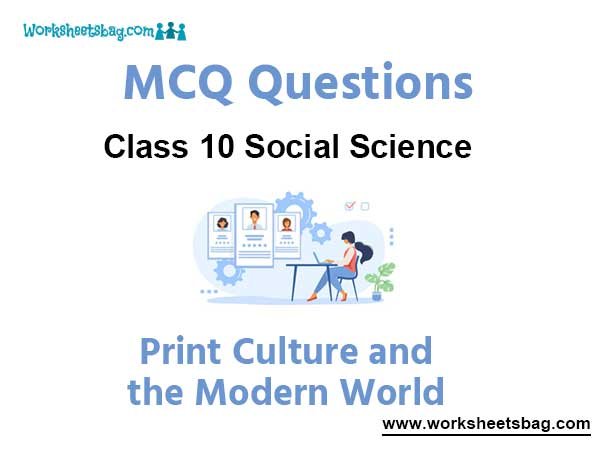Please refer to Print Culture And The Modern World MCQ Questions Class 10 Social Science below. These MCQ questions for Class 10 Social Science with answers have been designed as per the latest NCERT, CBSE books, and syllabus issued for the current academic year. These objective questions for Print Culture And The Modern World will help you to prepare for the exams and get more marks.
Print Culture And The Modern World MCQ Questions Class 10 Social Science
Please see solved MCQ Questions for Print Culture And The Modern World in Class 10 Social Science. All questions and answers have been prepared by expert faculty of standard 10 based on the latest examination guidelines.
MCQ Questions Class 10 Social Science Print Culture And The Modern World
Question. Printing was first developed in:
(a) Japan
(b) Portugal
(c) China
(d) Germany
Answer
C
Question. Who said. “Printing is the ultimate gift of God and the greatest one”.
(a) Charles Dickens
(b) J.V. Schely
(c) Mahatma Gandhi
(d) Martin Luther
Answer
D
Question. The news paper ‘Kesari’ was started by the Indian freedom fighter
(a) Balgangadhar Tilak.
(b) Bipin Chandra Pal.
(c) Dadabhai Naoroji.
(d) Sri Aurobindo.
Answer
A
Question. E.V. Ramaswamy Naicker from Madras is better known as
(a) Acharya.
(b) Guru.
(c) Saint.
(d) Periyar.
Answer
D
Question. Erasmus, a Latin scholar and a Catholic reformer, who criticised the excesses of Catholicism, expressed a deep anxiety about printing in his book
(a) Adages
(b) Confessiones
(c) De Doctrina Christiana
(d) De civitate dei
Answer
A
Question. “The Gita Govinda” was written by Jayadeva in the
(a) Sixteenth century.
(b) Seventeenth century.
(c) Eighteenth century
(d) Nineteenth century.
Answer
C
Question. The colonial rule’s attitude to freedom of the press in India changed after the
(a) Chauri-Chaura incident of 1922.
(b) Jallianwalla Bagh of 1919.
(c) Non Cooperation Movement of 1920.
(d) Revolt of 1857.
Answer
D
Question. When was the publication of Bengal Gazette initiated ?
(a) 1750
(b) 1780
(c) 1850
(d) 1880.
Answer
B
Question. Who among the following were the ones to bring a printing press in India.
(a) Dutch
(b) British
(c) Portuguese
(d) French
Answer
C
Question. The Vernacular Press Act of 1878 was modelled onthe
(a) Irish Brehon Laws.
(b) Irish Coercion Laws.
(c) Irish Restrictive Laws.
(d) Irish Press Laws.
Answer
D
Question. The Penny magazine was published especially for the
(a) business men
(b) children
(c) women
(d) workers
Answer
C,D
Question. Gutenberg was associated with :
(a) Powerloom
(b) Rail Engine
(c) Computer
(d) Printing Press
Answer
D
Question. Who began to edit the Bengal Gazette from 1780?
(a) Walter Scot
(b) Raja Ram Mohan Roy
(c) James Augustus Hicky
(d) Devendra Thakur
Answer
C
Question. Which one of the following led to the print revolution in world?
(a) Hand printing.
(b) Manuscript writing.
(c) Calligraphy.
(d) Mechanical printing.
Answer
D
Question. The first biography, ‘Amar Jiban’ in 1876 in Bengali language was written by
(a) Bibi Fatima.
(b) Pandita Ramubai.
(c) Kumardevi.
(d) Rashsuindari Debi.
Answer
D
Question. The first printed edition of the Ramcharitmanas of Tulsidas, came out from Calcutta in the year
(a) 1810
(b) 1813
(c) 1816
(d) 1817
Answer
A
Question. The number of Tamil texts printed by the Dutch Protestant missionaries by 1710 was
(a) 32 Tamil texts
(b) 37 Tamil texts
(c) 39 Tamil texts
(d) 40 Tamil texts
Answer
A
Question. Which one of the following journals was published in the late nineteenth century?
(a) Bombay Gazzette.
(b) Bengal Gazzette.
(c) Indian Charivari.
(d) Al-Hilal.
Answer
C
Question. First newspaper published in India was –
(a) Om Prakash
(b) Sambaddha kaumudi
(c) Rast-Goftar
(d) Bengal Gazzat
Answer
D
Question. Which Journal was started by Lokmanya Tilak in 1881 in Marathi
(a) Miraat
(b) Hindu
(c) Times to India
(d) Kesari
Answer
D
Question. Begum Rokeya Sakhawat Hossein addressed the Bengal Women’s Education Conference in
(a) 1926.
(b) 1927.
(c) 1928.
(d) 1929.
Answer
A
Question. The meaning of “Calligraphy” is
(a) kind of writing
(b) ancient library
(c) cultural practice
(d) book binding
Answer
A
Question. The power-driven cylindrical press was capable of printing
(a) 5,000 sheets per hour.
(b) 6,000 sheets per hour.
(c) 7,000 sheets per hour.
(d) 8,000 sheets per hour.
Answer
D
Question. The First Newspaper published in India was :
(a) The Bengal
(b) The Bengal Gazette
(c) The Hindi
(d) The Indian Mirror
Answer
B
Question. What was the theme of the Printing of Frederic Sorrieu-
(a) Democratic
(b) Socialistic
(c) Capitalistic
(d) None of above
Answer
A
Question. ‘Vellum’ was a
(a) paper made from wood.
(b) parchment made from the skin of animals.
(c) wood-pulp material.
(d) product for paper making.
Answer
B
Question. Who introduced hand-printing technology into Japan?
(a) Buddhist missionaries
(b) Christian missionaries
(c) Muslim mulavis
(d) Jainist missionaries
Answer
A
Question. The Calcutta Supreme Court had passed certain regulations to control press freedom by
(a) 1820’s.
(b) 1830’s.
(c) 1840’s.
(d) 1850’s
Answer
A
Question. Which of the following was the first Indian Newspaper ?
(a) The Tribune
(b) Times of India
(c) Bengal Gazette
(d) The Young India
Answer
C
Question. Who said, ‘Printing is the ultimate gift of God and the greatest one.”
(a) Charles Dickens
(b) J.V.Schely
(c) Mahatma Gandhi
(d) Martin Luther
Answer
D
Question. The Chinese city that became a new centre of printing technology in the nineteenth century was
(a) Beijing
(b) Tonkin
(c) Shanghai
(d) Yenan
Answer
C
Question. Who developed first known printing press in Strasbourg, Germany ?
(a) John Shelly.
(b) John Suleiman.
(c) Johann Guttenberg.
(d) John S. Mill.
Answer
C
Question. “The Ramcharitmanas” was written by
(a) Kambar.
(b) Thiruvalluva.
(c) Tulsidas.
(d) Ved Vyas.
Answer
C
Question. The shilling series was introduced in
(a) France
(b) US
(c) England
(d) Germany
Answer
C
Question. The “Sacchi Kavitayan” a collection of poems was written by
(a) Kailashbashini Debi
(b) Kashibaba.
(c) Ram Chaddha.
(d) Sudarshan Chakr.
Answer
D
Question. The novel “Istri Dharm Vichar” was written by
(a) Begum Rokeya Sakhawat.
(b) Pandita Ramabai.
(c) Ram Chaddha.
(d) Tarabai Shinde.
Answer
C
Question. The thinker Confucius belonged to the country
(a) England
(b) America
(c) China
(d) Japan.
Answer
C
Question. Consider the following events related to Print culture and identify the correct chronological response from the options given thereafter :
(a) Buddhist missionaries from China introduced hand printing technology into Japan around 768-770 AD.
(b) Gutenberg perfected the system of Olive Press.
(c) Marco Polo brought wood block printing technology of Italy.
(d) The earliest kind of print technology was developed in China.
(a) b,c,d,a
(b) d,a,c,b
(c) a,c,d,b
(d) b,d,a,c
Answer
B
Question. The Deoband Seminary was founded in
(a) 1865.
(b) 1866.
(c) 1867.
(d) 1868.
Answer
C
Question. In Bengal, an entire area in central Calcutta devoted to the printing of popular books was
(a) Battala
(b) Bagga Bazaar
(c) Boroline House
(d) Girish Avenue
Answer
A
Question. How many Theses Martin Luther wrote
(a) Sixteen
(b) Sixty
(c) Eighty Nine
(d) Ninety Five
Answer
D
Question. Rammohun Roy published the ‘Sambad Kaumudi’ in
(a) 1821.
(b) 1822.
(c) 1823.
(d) 1824.
Answer
A
Question. ‘Almanacs’ are the
(a) astronomical calendars.
(b) astrological calendars.
(c) regional calendars.
(d) ritual calendars.
Answer
A, D
Question. The first Indian weekly “Bengal Gazette” was edited by
(a) Gangadhar Bhattacharya.
(b) James Augustus Hickey
(c) Rammohun Roy.
(d) Raja Ravi Varma
Answer
B
Question. Bangalore cotton millworkers set up libraries to educate themselves following the example of
(a) Bengal mill workers.
(b) Bombay mill workers.
(c) Kanpur mill workers.
(d) Madras mill workers.
Answer
B
Question. The Indian Charivari was a journal of caricature and satire published in the late
(a) sixteenth century.
(b) seventeenth century.
(c) eighteenth century.
(d) nineteenth century.
Answer
D
FILL IN THE BLANKS
Question. The oldest Japanese book printed in AD. 868, is the Buddhist ________ .
Answer
Diamond Sutra
Question. The Luxury editions of books were hand written on very expensive ________ .
Answer
Vellum
Question. ________ developed the first known printing press in the 1430s.
Answer
Johann Gutenberg
Question. In 1517, the religious reformer ________ wrote ‘Ninety Fie Theses’.
Answer
Martin Luther
Question. In France the ________ were low-priced small books printed on poor quality paper with blue cover.
Answer
Biliotheque Bleue
TRUE / FALSE
Question. Print popularised the ideas of the Enlightenment thinkers.
Answer
True
Question. The Grimm Brothers in France gathered, edited and published short stories collection in 1812.
Answer
False
Question. In the 1920s in England, popular works were sold in cheap series, called the ‘Shilling Series.
Answer
True
Question. The first Indian newspaper to be published was Bengal Gazette.
Answer
True
Question. Tarabai Shinde and Pandita Ramabai from Tamil Nadu wrote about the miserable lives of upper caste Hindu women, especially widows.
Answer
False



